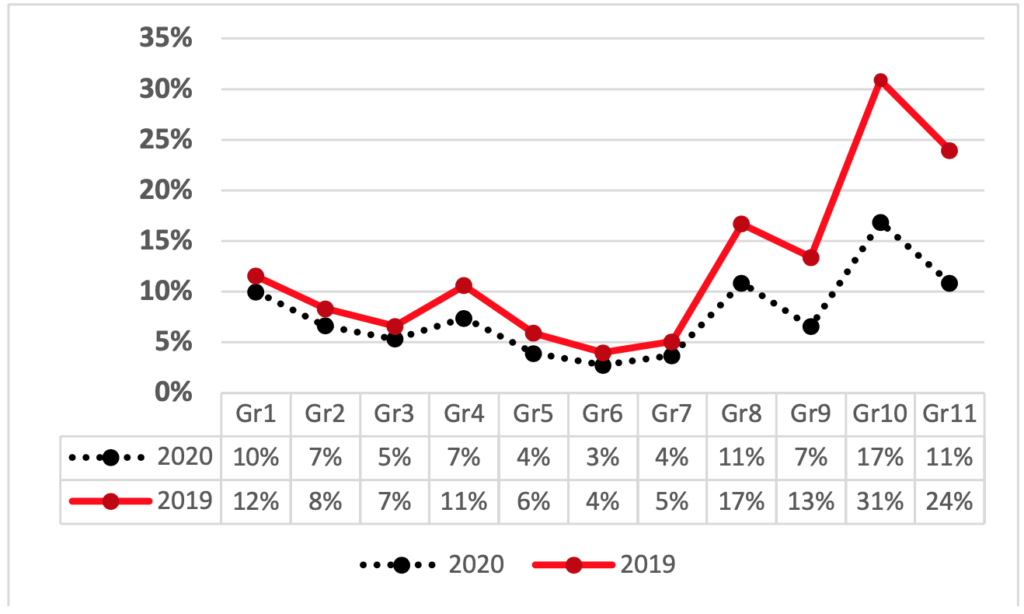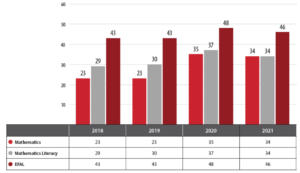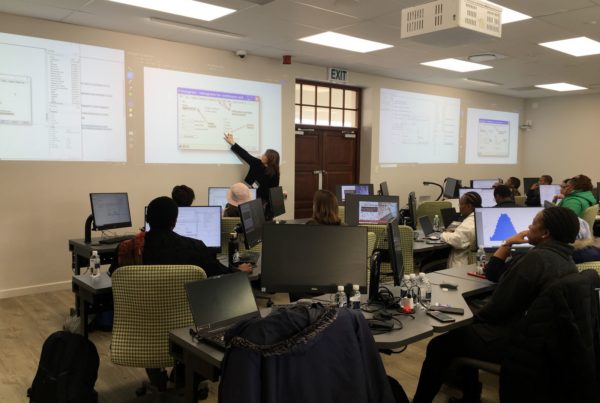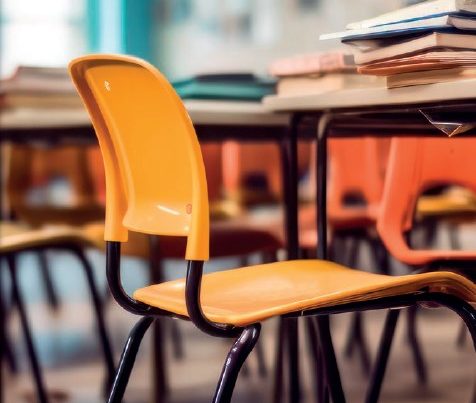New research by RESEP, the Research Group on Socio-Economic Policy at Stellenbosch University, shows how the more lenient promotion policies introduced in response to the Covid pandemic drastically reduced repetition and caused massive increases in the numbers of matriculant and matric and bachelor passes.
Although the pandemic, school closures and rotational timetabling caused severe learning losses, more lenient assessment improved learner marks and accelerated learner flows through the school system. The greater leniency in promotion rules was a logical and fair response by the Department of Basic Education (DBE)‘s to accommodate learners who had missed so much school through no fault of their own. The effect of more lenient assessment was evident in much lower repetition rates in 2020 than in 2019, especially in the higher grades, where repetition rates are usually quite high (see Figure 1). Repetition rates in 2021 were not yet available at the national level. However, data from three provinces suggest that these were about midway between the 2019 and 2020 levels, i.e. still more lenient than in the past.
South African repetition rates by grade before and during Covid

Source: LURITS data provided by the Department of Basic Education.
For Grades 10 and 11, the DBE increased the school-based assessment component of the promotion requirements from 25% to 60% and replaced the end-of-year examinations with controlled tests. A DBE circular stated that these tests “should only be set on content taught, content not taught cannot be assessed”.
School-based assessments (SBAs), the marks learners obtain from class tests and assignments, have not yet been analysed much. The figure below shows an example of how the greater leniency in marking and the reduced volume of work tested during the pandemic affected school-based assessment. It compares the average Grade 10 marks in school-based assessments in the fourth term for most Eastern Cape schools
in the two years before the pandemic (2018 and 2019) to the marks achieved in 2020 and 2021 (the pandemic years). In all three subjects shown (Mathematics, Mathematical Literacy and English First- Additional Language or EFAL), there was a noteworthy increase in marks in the pandemic years compared to earlier ones.
Eastern Cape Grade 10 school-based assessment marks (in percentages) in three subjects, 2018-2019

Source: SA-SAMS data obtained from the Data Driven Districts data.
This greater leniency accelerated learner flows through the education system and sharply reduced drop-out in the higher grades. But one knock-on effect was a 44% increase in the numbers reaching matric between 2019 and 2022 (see Table below). But as recent media reports showed, pass rates or bachelor pass rates did not decline despite the much larger number of candidates that had reached matric. The number that passed matric increased by almost the same percentage as the number of candidates, and a rising bachelor’s pass rate meant that bachelor’s passes rose by half in these three years. These enormous increases, despite the learning losses caused by the Covid pandemic – a worldwide phenomenon – may seriously erode public confidence in the matric results and thereby endanger the integrity of the NSC examinations.
Results of full-time learners in NSC examinations, 2019 and 2022

The report also illustrates how new data on teachers, school location and subject choice make it possible to highlight important dynamics in the system. It also contains the first analysis of feeder schools from administrative data. This further strengthens the case for enhanced efforts to improve the availability and quality of administrative data for policymaking and administration in South Africa’s school system.







